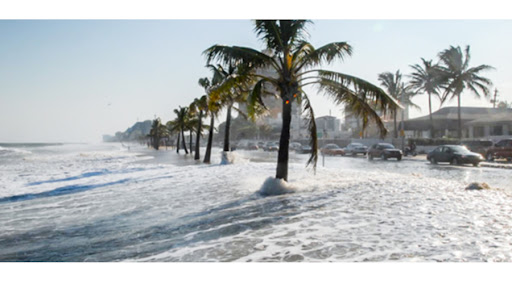16 May 2022
Tuvalu fears that climate change, an existential threat to the Pacific nation, is being forgotten and it worries that fellow island nations could become “pawns” in a global competition between China and the United States, its foreign minister said.
Simon Kofe told Reuters the superpower competition was a concern, distracting attention from climate change, the priority for Pacific islands endangered by rising sea levels.
“It is important that the Pacific handles these issues carefully,” he said in an interview last Thursday. “The last thing we want is that countries in the Pacific are used against each other or used as pawns.”
Kofe grabbed global attention for his nation of 12,000 people last year when he addressed a global climate conference standing ankle deep in the sea to illustrate Tuvalu was “sinking”. Forty percent of the capital district is underwater at high tide, and the tiny country is forecast to be submerged by the end of the century.
Pacific Island leaders will discuss a controversial new security pact between the Solomon Islands and China at a meeting next month, Kofe said. He said he had been briefed on the issue by his Solomon Islands counterpart and that, although Honiara said it was an internal matter, it had regional implications.
“In the Pacific, the way we handle issues, the Pacific way, is by consensus, is by sitting down and face to face,” he said. COVID-19 has prevented in-person meetings for two years, and “some of these critical issues can only be resolved when you meet face to face and really have a frank discussion.”
The United States has warned the Solomon Islands it would have “significant concerns and respond accordingly” to any steps to establish a permanent Chinese military presence, after it struck the security pact, which has also alarmed allies Australia, New Zealand and Japan.
Beijing says the deal covers internal security, not a base, and criticism by western countries was interfering in the Solomon Island’s sovereign decision-making.
Another key issue for Tuvalu is fishing, where China is seeking more agreements with Pacific islands for its fleet. Washington says it will soon announce plans to battle illegal fishing in the region, as part of increased U.S engagement to counter China’s growing influence.
“The Pacific is the richest fishing ground in the world and is said to be the last healthy fish stock of tuna,” Kofe said. “That is really a tribute to the conservation and management measures applied by the Pacific island countries.”
Tiny Pacific islands, feeding the world from their economic exclusion zones, carry a disproportionate burden, he said.
“Tuna is supporting the economies of Japan, China, many countries around the world,” he said. “Bigger players that are coming into the region need to listen and look at what the Pacific is doing right now and use that as lessons for collaboration on issues other than fisheries.”
Seeking an international platform on climate change, Tuvalu has proposed its former governor-general, Iakoba Taeia Italeli, become secretary general of the Commonwealth – the first time a Pacific nation has sought the role in the grouping.
“It’s time for the Pacific to have a chance to lead and unite the Commonwealth,” Italeli told Reuters in the same interview, conducted remotely.
Commonwealth heads of government, meeting in Rwanda in June, will select the next public face of the 54-member group of countries with ties to the former British empire. The incumbent, British peer Patricia Scotland, is running for another term in the hotly contested race.
The Commonwealth had “failed to speak with one voice” at COP26, Italeli said, despite including 32 of the world’s 42 smallest states, which are heavily affected by climate change.
At the next global climate change conference, in Egypt in November, Tuvalu will continue its push for easier financing for small islands states to build the physical infrastructure they need to “save themselves”, Italeli said
Source Reuters.
In separate news, communities in many of Kiribati's most remote areas will receive much-needed support for climate resilience as part of a new US$20 million climate change adaptation project.
The World Bank has approved the Kiribati Outer Islands Resilience and Adaptation Project to work with 20 island councils across Kiribati as well as the three urban councils on Tarawa.
The project is investing in community-level climate resilience that will directly support an estimated 14,000 people - equivalent to 12 percent of the population.
The measures include improving access to fresh water, drainage improvements, coastal protection, upgrades to public buildings and critical facilities, as well as maintenance equipment and climate-resilient solutions for flooding.
"There are arguably few places in greater need of support and protection for the impacts of climate change than the communities living in Kiribati's outer islands," said Lasse Melgaard, World Bank Resident Representative for the South Pacific.
"Yet we are acutely aware that the impacts of climate change can vary significantly across communities and islands. This new project will see communities working closely with the national government and the World Bank to ensure those communities get the support they are most urgently seeking."
Vice President and Minister of Finance and Economic Development, Teuea Toatu said the needs of the outer island communities are significant.
"We are pleased to be working with all 20 Island Councils - supported by the World Bank - to deliver such critical infrastructure and basic services that will support communities' resilience."
The project builds on decades of World Bank support to Kiribati for climate adaptation and disaster resilience, including the Kiribati Adaptation Program, which supported coastal protection works, access to fresh water supply, and a grant scheme for community infrastructure.
Source. Radio New Zealand.
Yours sincerely
Frank Short



